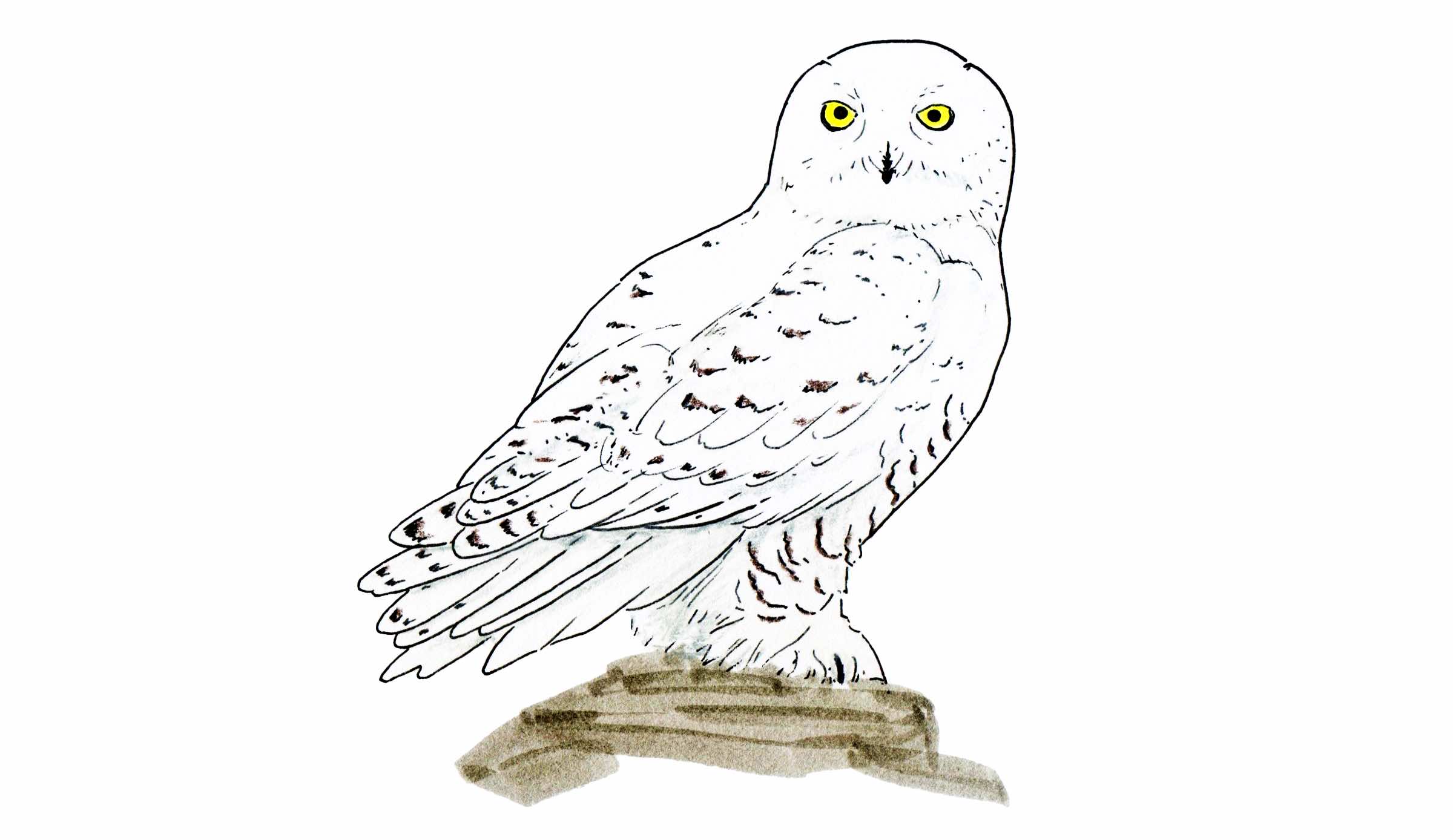Snowy Owl
Bubo scandiacus
Interested in reading the “Bird Ethnography of the Chugach Region” book?
Snowy Owl
Bubo scandiacus
yartuliq (LCI), ig’it/anipaq (PWS), GeeLgAlid (Eyak)
There are several species of owls that breed and visit the Chugach Region. Great Horned Owl (Bubo virginianus) is a common resident, perhaps the most conspicuous nocturnal owl in the region, and occurs regularly throughout the forest and woodland areas of the Copper River Delta, Prince William Sound, and Resurrection Valley. The Short-eared Owl (Asio flammeus) is a resident of the Chugach Region, occurring seasonally as a common migrant, an uncommon local breeder, and rare winter visitor. The Northern Hawk Owl (Surnia ulula) is an uncommon year- round resident of forested areas of the Chugach Region. Great Gray Owl (Strix nebulossa), Boreal Owl (Aegolius funereus), Northern Pygmy Owl (Glaucidium gnoma), Northern Saw-whet Owl (Aegolius acadicus), and Western Screech Owl (Megascops kennicottii) are all rare residents of the Chugach Region. The Snow Owl is only a visitor to the region but is certainly conspicuous when it appears, often in the fall.
Description
The Snowy Owl, also called the Arctic Owl, is the heaviest owl in Alaska. It is also the only owl that displays sexual dimorphism, in which the sexes of a species have distinct differences in their physical characteristics. The males are completely (or mostly) white, whereas the females have many brown spots and flecks all over their white plumage. The feathers of both sexes are very dense around the legs which causes them to look rounded when sitting.
Snowy Owl (male) or yartuliq (LCI) or ig’it/anipaq (PWS) or GeeLgAlid (Eyak)
Illustration by Kim McNett
Habitat and Status
Snowy Owls are rare winter visitors in the Chugach Region, although they disperse from their arctic range to areas much further south every four or five years (called an irruption), generally coinciding with high lemming populations the summer before. Snowy Owls often prefer to sit right on the ground when hunting, so they can be found in wide-open tundra or spaces with little to no trees. They use both their sight and hearing to hunt, both day and night, small mammals like voles and lemmings. Occasionally, they will take larger prey, like ducks, if food is scarce. Although most owl species are known to hunt at night and sleep during the day, Snowy Owls often hunt during the day, especially in the summertime when there is no other choice in the high Arctic.
Snowy Owl populations worldwide are 14% of what they were in 2013. They are now considered vulnerable by the International Union for Conservation of Nature. In contrast, other owl species are moving northward up the Pacific coast as the climate warms. The Northern Saw-whet is more common in the Chugach Region, and the Northern Pygmy Owl and Barred Owl (Strix varia) appear to be so, too (Audubon Society 2019).
Distribution of Snowy Owls in the Chugach Region.
Traditional Use
“Throughout Alaska, Native people associate nocturnal, carnivorous owls with the supernatural. Among the Tlingit, owls are feared. They are believed to bring bad news, foretelling warfare, sickness, fire, and accidents with their hoots. Moreover, witches are said to transform themselves into owls. The Unangax believed owls were magical and dismembered captured birds to release their powerful spirits. The Yup’ik associate owls with shamanism due to their extraordinary vision” (Alutiiq Museum).
Chugach people believed spirits often appear in the form of owls, as well as cranes. If an owl hoots nearby a village, it’s said that it was a spirit giving the village shaman news. A wooden mask recovered from a late prehistoric Alutiiq village near Karluk (Kodiak) features the face of a short-eared owl (Alutiiq Museum). This rare depiction of a bird’s face on a mask suggests the artifact was spiritually powerful.
In one traditional story of foretelling bad news, some men who were camping heard Owl during the night. Owl said, “David is dead. David is dead.” The man woke the other men and told them to listen. “Listen to the owl,” he said. They all got up and listened for the owl. Soon they heard the owl. The owl said, “David is dead.” One of the men said, “The owl is wise. We should go home.” So they picked up their belongings and went home where David was found dead (Sawden and Pulu 1979).
One traditional story certainly suggests that bad things will happen if you don’t listen to owls.
In The Deceived Husband, Tugatuaq from Kangilik, a village near Seward, leaves his wife and their kids to go hunting. It became stormy while he was gone, and he did not return home when he said he would. His wife, Aqa, thought he drowned while he was trying to return home. Many days later the bird started singing early in the morning, “Aqa come out, Aqa come out, Tugatuaq is rounding the point.” But Aqa was asleep and had already married another man since she thought Tugatuaq was dead. “Why don’t you come out [of the sleeping room], he has arrived already,” the owl sang, but Aqa did not wake up. The bird continued to try to wake Aqa, “Aqa come out, Aqa come out, Tugatuaq is already on the trail.” It was early in the morning, and she did not wake up as Tugatuaq approached, “Aqa come out, Aqa come out, Tugatuaq is already at the door.” The owl continued to try to wake the sleeping Aqa, “Aqa come out, Aqa come out. Tugatuaq is opening the door.” It continued singing, “He is already inside the door of the smokehouse…He is now at the door of your sleeping room…” At that moment, Tugatuaq entered the sleeping room and pulled the man out of bed by his hair and speared him, then did the same to his wife. He then went with the bird to the neighboring village, Ualeq, where his wife’s family is from. He told the relatives that he killed the man and Aqa because she “slept with another man and did not pay attention to the small bird.” Tugatuaq then asked for another woman and said he would not move to another village afterwards. They gave him another woman, and he stayed in the village with her (as told by Makari Chimovitsky).
In another story, Owl doesn’t simply foretell bad news or warn the listener but is the agent of death. Once, a very bad boy in one of the villages cried for this and that. No matter what he was given, he would want something else and would cry until he got it. One of the wise men told his mother that Owl would get him if he did not stop crying about everything. But he was hard to please, and one-night Owl came down through the smoke hole and took him away, never to be seen again (Birket-Smith and de Laguna 1938).
Continue Your Search Below




